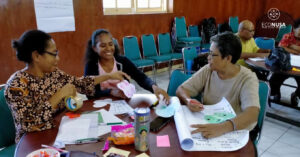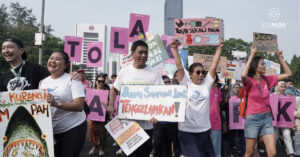
Government of West Papua conducted evaluation of all palm oil plantation licenses owned by companies. Since 2018, they have called the companies operating in West Papua to complete and submit their data of plantation licenses to the government of West Papua. The findings found that not all primary forests and forested areas have been converted into palm oil plantation. There are still a number of forested areas so that there are open opportunities to save forests cover in Tanah Papua. Some number of companies also declared that they would stop their plantation operations.
Plantation Division Head of West Papua’s Food, Horticulture and Plantation Office, Benidiktus Hery Wijayanto, said that license review of palm oil plantation companies was the mandate of the Presidential Instruction No. 8/2018 on the Suspension and Evaluation of Palm Oil Plantation License and Productivity Boost of Palm Oil Plantation or Palm Oil Moratorium Presidential Instruction.
“The license review goes along with the Declaration of Manokwari on Sustainable Development based on Customary Land in Tanah Papua issued in 2018. So, there is a connecting line. We want a company on the ground to pay attention to applicable environmental principle,” said Hery to EcoNusa on 26 January 2021.
The process of palm oil license review was done in cooperation with the Corruption Eradication Commission (KPK). The antigraft institution is one of the 27 ministries and institutions involving in the National Movement to Save Natural Resources (GNP-SDA) since 2015. Besides, the West Papua Government also collaborated with EcoNusa Foundation to assist the legal and spatial analysis.
Hery said the West Papua government’s disorganized documents become the early challenge during the evaluation process. They then created matrix of findings and recommendations as the guideline of data collection that needs confirmation from companies. The evaluation team also held a flyover to confirm the ground condition of the plantation.
“We use instrument of Plantation Business Assessment to all companies. They must not operate, if they just traded in land, owned less license, expired license. We do not want that case to happen again,” said Hery.
KPK’ Monitoring Directorate Functional Sulistyanto said that palm oil license evaluation in West Papua was the measure to improve license governance. KPK found that the GNP-SDA’s four targeted sectors of license management ecosystem, forestry, mining, plantation, marine and fisheries, remain worrying. According to Sulistyanto, license ecosystem improvement will minimize potential of corruption.
“There are so overlapping. For instance, Cultivation Rights (HGU) for palm oil and mining, palm oil HGU and Industrial Forest Permit (HTI), palm oil HGU and Forests Concession Rights (HPH). It means in the context of land-based license, the licensing is very disorganized,” he said.
Sulistyanto added that collaborative works made the license review process is more effective. Administration analysis of licensing and spatial and finding clarification to the company will validated the found data. The license review team has currently finalizing the evaluation results before submitting it to the West Papua Governor, Dominggus Mandacan.
Both Hery and Sulistyanto agreed the method used during the license review process could be applied to other sectors such as mining, forestry, marine and fisheries. “The typology of problem might be different, but we could adopt the process, strategy and the likes as lessons learned to the other provinces,” said Sulistyanto.
Editor: Leo Wahyudi & Cindy Junicke Simangunsong







